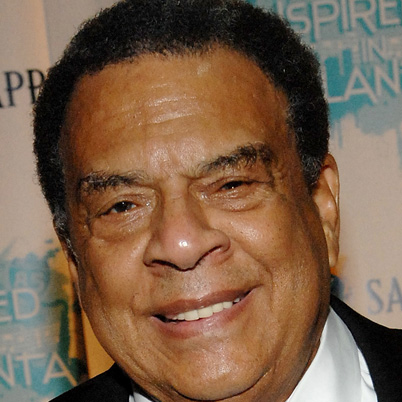Boston—U.S. Ambassador Andrew Young turns 81 this week. He was barely into his 30s when he traveled with the Rev. Dr. Martin Luther King Jr. and fewer than eight other civil rights activists to confront the violent, insidious racism of Birmingham, Ala.
Wearing a blue bow tie, a sweater vest, and a calm mien, Young sat down at Harvard University for “A Freedom Fighter Looks Back: A Conversation With Ambassador Andrew Young on the 50th Anniversary of King’s Letter From Birmingham Jail.”
“Today, key provisions of the Voting Rights Act are under attack,” observed Young’s host, Henry Louis Gates Jr., director of the W.E.B. Du Bois Institute for African and African American Research and Anisfield-Wolf jury chair.
The afternoon began with a distilled tutorial on the legendary letter. Jonathan Rieder, a Barnard College sociologist, played an audiotape of King talking about the water cannon and police dogs of T. Eugene (Bull) Connor, Birmingham’s notorious public safety commissioner.
“We will leave them gutted by their own barbarity,” King said on the tape, as Young sat listening, his eyes closed. King saw the water cannon – which would hospitalize the Rev. Fred Shuttlesworth — as a form of baptism. “Growing up, I was dog-bitten for nothing,” he said. “I don’t mind being bitten for freedom.” King described Bull Connor moving around in a white tank: “They can get their dogs, get their water hoses, Bull Connor can even get his white tank. Our dark faces will stand up in front of that white tank.”
Quietly, Young suggested his listeners “get the frame right. We went there with a plan, and we started back in January [1963]. My job was nursing the negotiation process – the outreach to the Episcopal bishop, business leaders, and students.”
The economic boycott of Birmingham – supporters bought nothing but food and medicine – was 95 percent successful, Young said. From January through April 1963, the slogan was “blue jeans for Easter.” All the while, Young, the Rev. Ralph Abernathy, King, and Shuttlesworth pressed the Birmingham department store owners to allow their black “maids” to sell clothes. They demanded the segregated signs over drinking fountains come down.
“They cussed us out,” Young remembered. Meanwhile, in Alabama’s largest city, a young black delivery boy had been castrated and dozens of bombings of black homes and churches were unsolved.
“Martin had not really recovered,” Young said. “He was stabbed in the chest in ’58. He was arrested in the middle of the night in ’60 and put in chains, then driven four and half hours on the bad, back roads of Georgia in the back of a paddy wagon with a German shepherd. He was just 30 years old, and that was as close to a nervous breakdown as he came – that was what killed Steven Biko,” the South African whose 1977 death after 11 hours in a police Land Rover helped draw global attention to the evils of apartheid.
In Birmingham, King was “being pressed to give up. He was thrown in jail, he was despairing, and then he wrote that beautiful letter,” Young said. Galvanized by a public “Call for Unity” from eight Alabama clergy – who called King an outsider and a troublemaker – King used the margins of a newspaper to write what became a sacred text of the 20th century.
Young described King as a prophet, but insisted the rest of the activists were unremarkable. He quoted his daughter Andrea, who edited his 1996 memoir, “An Easy Burden.” She said: “You were just some get-down brothers in the right place at the right time and you did the right thing.”
Young made it clear that his time in Birmingham was “a religious experience,” that he felt the presence of God when King was in jail and the nation newly stunned by television scenes of dogs tearing at the legs of nonviolent protesters, and blasts from fire hoses knocking children down.
The protesters returned, he remembered, and someone shouted for prayer: “You had 5,000 black folk on their knees, and what you heard was not so much prayer as a moan. We were singing, ‘I want Jesus to walk with me’ and, even with Bull Connor yelling at them, the firemen let their hoses drop, and the dogs didn’t bark, and we got up and walked to City Hall.”
Young, an ordained United Church of Christ minister, joked that the Baptist men around him didn’t take his faith too seriously, but he saw that jail – in that context — could be sanctifying: “We had Bible study three times a day and freedom songs all day and all night. For some of the youngsters, it was the closest they had to a loving spiritual experience.”
The movement began, Young said, to fight racism, war, and poverty: “Now, legal racism is dead and war is increasingly seen as unpopular and irrational. But we criminalize poverty and put poor people in jail at a greater expense than it would be to educate them.”
During the questions, a young woman asked the ambassador to identify a few key characteristics that will help new movements rise. Carolyn McClain Young, the ambassador’s wife, spoke up from the audience. She advised the student to look into her own heart, and to take a lesson from King’s father, “Daddy King”:
“In life, everyone is given a cross. When you really arrive is when you pick up the cross not given you. When you pick up the other’s cross and carry it.”
She sat down and Young waited to catch her eye. He held it for a second, and nodded.
